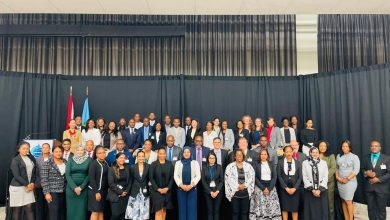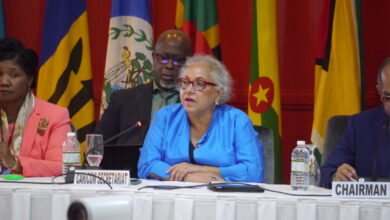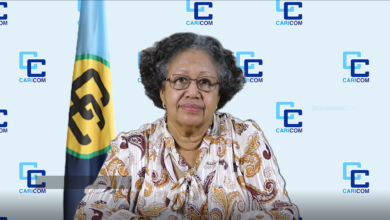It is my pleasure to bring you greetings on behalf of the Secretary-General of the Caribbean Community, and indeed the entire Community on the occasion of the 24th Conference of your esteemed Association.
I recall my first contact with this Association, on one of the first assignments which I undertook soon after joining the CARICOM Secretariat, nine years ago, when my colleague Colonel Fairbairn Liverpool and I met with the then Secretary/Treasurer of ACCP (The renowned Laurie Lewis) to agree on a framework to implement a decision of the Inter-Governmental Task Force on Drugs and Crime on the coordination of regional joint law enforcement operations.
I became aware that your vibrant network which had its genesis at a conference of Regional Police Commissioners, held in Port- of-Spain, Trinidad in 1972. I learnt from Commissioner Laurie Lewis that the Association of Caribbean Commissioners of Police (ACCP) was officially established in 1987 in St Lucia. The brief I got then, if I recall correctly, informed me that your mission was to be the principal regional organisation for promoting and facilitating:
• Collaboration and cooperation in the development and implementation of policing strategies, systems and procedures;
• The professional and technical skills development of police officers; and
• Proactive measures to prevent crime and improve police community relations.
Since my first contact with ACCP so much has happened in the changing landscape of responses to international , regional and national issues, none more dramatic and far reaching than 9-11; none more profound than the current economic and financial crises. Equally challenging is the escalation of crime and violence and crime linked to drugs and illicit firearms that are undermining the social fabric of our societies, increasing risk behaviours especially among the youth, corrupting public morals, destabilizing our economies and demoralizing the environment in which ordinary Caribbean people exist through fear for their lives and livelihood. The situation is compounded by the fact that Caribbean countries are sandwiched between the major drug producing countries in the South and the largest markets in the North.
Over the period since my first engagement with the ACCP, the law enforcement system, in particular the police forces across the Region, have borne the brunt of the charge to stem the tide of crime and violence and have also borne the brunt of the critical responses from a wide cross- section of the Caribbean public and the media which are indications of the enormously high expectations of the role that you are required to play in the safety and security of our societies.
It is clear that the Region owes our protective services and the ACCP in particular, a debt of gratitude for the overall unstinting dedication to service against extreme odds, including lack of human, physical, and financial resources. Much has been done by your Association to improve the thinking and practice of policing and in particular to address the theme of this Conference: Police Reform as an Imperative for Quality Service.
There are many examples of initiatives to enhance training and to collaborate across the Region in rapid response activities of which the participation of the protective services from CARICOM Member States in the security arrangements for the Fifth Summit of the Americas in Trinidad and Tobago in April 2009 and previously; during the ICC/CWC 2007 are outstanding examples.
While there have been investments by respective governments in upgrading the infrastructure to facilitate the work of the police services, much more needs to be done to improve the enabling environment in which police officers function. A visit to the several police stations in Georgetown and its environs, for example, would illustrate the substandard facilities in which we expect our police officers to work and be effective and, from all reports, the dehumanizing conditions under which prisoners are detained at some police stations, epitomize the abuse of their human rights. This, in turn, has serious implications for the image of the police and the legitimacy of their role as one of the agencies of human and social development. Hopefully, these conditions in our detention centers and prisons are not widespread throughout Guyana and the Region. If so, there is a crisis that must be urgently addressed.
What emerges from this observation is a need to incorporate in any strategy of policy reform, improving the conditions of service for police officers as well as the environment in which citizens are detained or incarcerated. The ACCP can contribute greatly by establishing protocols and standards for implementing requirements in these areas that form part of the structure of police reform, intended to combine appropriate punishment with a formula for rehabilitation of those who commit crimes and reintegrating them into society, as worthwhile citizens.
At the regional level, ACCP can be proud of the initiatives in which they have been involved and helped to evolve over the past 7-8 years. The ACCP, for example, participated actively as part of the CARICOM Task Force on Crime and Security in a process that resulted in the CARICOM Report on Crime and Security presented to the Conference of Heads of Government held in Guyana in 2002. This Report highlighted some of the critical elements that must form part of new approaches to tackling crime and violence of which community policing, the establishment of National broad-based Commissions for Crime, and involving the ACCP in the structure of governance in any new architecture for crime reduction were prerequisites. In this regard, the adoption of e-trace technology in your crime fighting arsenal certainly attests to the excellent progress being made by ACCP and the capability of the ACCP to play a leading role.
Our Heads of Government in 2006 declared crime security as the fourth pillar of the Community alongside trade and economic integration, foreign policy relations and functional cooperation. They also approved a new architecture to manage the regional crime and security agenda, by establishing the Council for National Security and Law Enforcement (CONSLE) as the policy making body and the Implementation Agency for Crime and Security (CARICOM IMPACS) which replaced the Task Force as the implementation arm of the Council.
In this regard, the CARICOM Commissioners of Police, through engagement in this new system, is expected to play a vital role in the regional programme. The issue that emerges is what can be done to rationalize resources to the extent that the ACCP becomes an integral part of the new architecture; failing which we will tend to end up with unnecessary duplication of effort. Hence, in your deliberations, you may wish to revisit this issue and come up with a concrete solution.
The challenges faced by the Region in dealing with crime and violence are well known. The crime statistics for many countries in the Region are distinctly disturbing. The strategy enunciated by CONSLE places emphasis on collaboration in border security, information and surveillance, witness protection, control of drugs and arms, training and capacity building of the law enforcement and protective services. So far, there has been some progress. But it is increasingly being recognized that the key to a sustainable programme rests with the construction and implementation of crime prevention strategies. This requires a new approach to partnerships between the police and other stakeholders in the government service, private sector, civil society, the schools and youth movements and faith-based organizations.
There ought also to be an alliance between the police and our research centers that provides analysis of trends and guidelines for behaviour change. In this regard, the ACCP should seek to follow up with and support the call of the Vice Chancellor of the University of the West Indies to establish a Centre of Excellence for Crime and Violence to be involved in research and training. Herein lies a useful focal point to provide the empirical information to guide, monitor and evaluate the impact of police reform programmes.
The underlying factors of police reform rest with the creation of viable networks around common goals and practices. This is aptly articulated in a recent editorial of one of the Guyanese newspapers:
“The events of the past decade have made it clear that the brute force tactic of sending out hunting parties to shoot down bandits has not eradicated those transnational crimes which keep pumping guns, drugs, dirty money and criminal violence into the country. Systematic police reform- that emphasizes crime intelligence and human security- is necessary if the country is to enjoy a sustained era of public safety and economic stability. Only a transformed security environment will attract foreign investment and persuade local talent to remain in the country.”
Because of my responsibility for Human and Social Development within the CARICOM Secretariat, it would be remiss of me, if I did not take this opportunity to share with you and seek your support for an initiative which my Directorate has been mandated to spearhead in collaboration with the United Nations Office of Drug and Crime (UNODC).
Following the presentation by representatives of UNODC and the World Bank on their joint 2007 Report of “Crime, Violence, and Development: Trends, Costs and Policy Options in the Caribbean” to the Fifth Meeting of CONSLE in February 2008, the Twelfth Special Meeting of COHSOD in March 2008, “mandated CARICOM Secretariat to collaborate with the International Organizations and Third States in developing a regional crime prevention initiative to complement the national and bilateral efforts”.
As a result, UNODC and CARICOM are jointly developing the “CARICOM Social and Development Crime Prevention Action Plan (2009-2013)”, aimed at focusing interventions to facilitate reform with five elements:
(i) reducing violence,
(ii) fostering social inclusion,
(iii) promoting reintegration,
(iv) empowering victims and
(v) protecting the environmental and economic resources.
Resources are currently being mobilized for the Plan to be implemented in coordination and cooperation with UN agencies, the universities and other entities, including Civil Society. There are two main target groups :
a) children and youth at risk of engaging in violent behaviour and criminal activities; groups exposed to high levels of violence; and those already in conflict with the law; and
b) The institutions which are involved in the criminal justice system, particularly the police, judiciary, prison system and school system.
In order to implement this programme to bring about the anticipated institutional reform, we look forward to building partnerships with ACCP and the respective police forces throughout the Caribbean.
We in the Secretariat look forward to continued partnership with the ACCP in the process of police reform, which we agree is an imperative of quality service.
I thank you!






